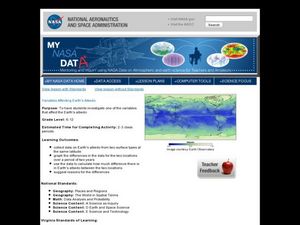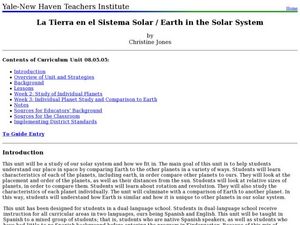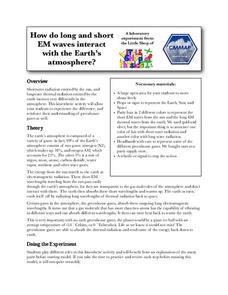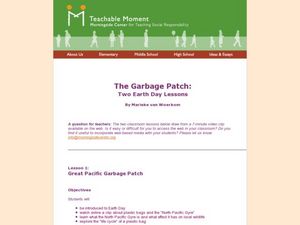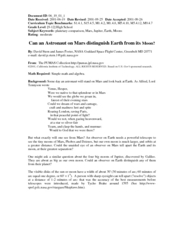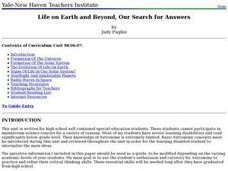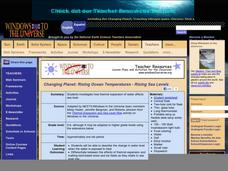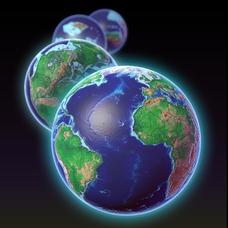Curated OER
Changing Planet: Permafrost Gas Leak
Pair earth scientists up to use an amazing online arctic portal mapping tool and Google Earth to analyze permafrost changes. They compare changes to data on atmospheric concentrations of methane to see if there is a correlation. Then...
Curated OER
Variables Affecting Earth's Albedo
Students study the variables that affect the Earth's albedo. In this environmental data analysis lesson students interpret and graph information and calculate changes.
Columbus City Schools
Planet X
How did the earth become the mass that it is now? Your young scientists explore this question through the concept of density. Their inquiries consider the impact of gravity on the formation of planets. The culminating activity of the...
Curated OER
TARGET EARTH
Students explore the possibility of an asteroid hitting planet earth. In this planetary instructional activity students complete a lab activity to see the effects of an asteroid hitting earth and compare different craters.
PBS
The Planets of the Solar System
Launch a lesson that's sure to capture middle schoolers' interest! Exploration enthusiasts examine the planets of our solar system using an activity from PBS's Space series. The resource includes images and information for each planet,...
Curated OER
Earth in the Solar System
A three-week unit designed to be completed in an elementary level, dual-language immersion classroom, this resource includes several lessons intended to introduce young learners to the solar system, the Earth and how the Earth compares...
Redefining Progress
Have and Have-Not
Is there a correlation between a country's wealth and the extent of its ecological footprint? What exactly constitutes an ecological footprint, and how does one country stack up against the rest? This is a unique lesson to incorporate...
Colorado State University
How Do Long and Short EM Waves Interact with the Earth's Atmosphere?
Things are about to heat up in your classroom! A kinesthetic lesson asks learners to play the part of the gases in the earth's atmosphere and interact with the sun's radiation. The focus is to learn the impact of the increasing...
Curated OER
The Garbage Patch: Two Earth day Lessons
Students view a seven minute video called Gorilla in the Greenhouse. In this Earth day lesson, students review the history of Earth day. Students work in groups to describe the life cycle of a plastic bag. Students understand that...
Curated OER
Birth of the Earth
Students examine the major events that have taken place in the Earth's development. In this Earth lesson students view a video and put major events in chronological order.
Curated OER
Development of a Habitable Planet
Students identify and sequence the major events that caused Earth to develop into a habitable planet. They view videos, conduct research, participate in discussions and work in groups to determine the likelihood of other habitable worlds.
Curated OER
Modeling Hot and Cold Planets
Young scholars, in teams, design and construct models of two planets, one hot and the other cold, using a variety of materials. They attempt to create the models out of substances that will actually show the greatest temperature...
Curated OER
Origins: Earth Is Born
Students develop a timeline of all the major events involved in the formation of the Earth and the emergence of humans. In groups, they focus on a specific topic by watching a PBS program and taking notes. After the video, they list...
Curated OER
Exploring the Planets
Students study robotic spacecrafts that have provided detailed information about the inner and outer planets. For this exploring the planets lesson plan, students use posters and diagrams to study the various robotic spacecraft sent to...
Curated OER
Reflections on Earth: Exploring Planet Earth from Space
Students examine satellite images of Earth and contrast images at different scales. In this exploring Earth from space lesson plan, students use satellite images to contrast images at different scales, calculate distances from the scale...
Curated OER
The Physics of the Planets: How 16th and 17th Century Physicist Helped Us Understand Our Solar System
Eighth graders draw the paths of the planets in the solar system. In this astronomy lesson, 8th graders calculate speed of objects using distance and time information. They research about the work of scientists in the 16th and 17th century.
Alabama Learning Exchange
Our Restless Planet
Students examine the topic of the Earth's rotation, revolution, and orbit. They observe teacher-led demonstrations, explore various websites, write journal entries, conduct a demonstration of why Earth experiences day and night, and...
Curated OER
Digging the Earth's Crust
Students investigate the Earth's crust. In this geology lesson, students identify the materials made up of the Earth's crust and investigate the different kinds of soil.
Curated OER
Can an Astronaut on Mars Distinguish Earth from its Moon?
Students explore the possibility of being on Mars and being able to identify the Earth. In this space lesson plan students complete a set of calculations to see if this is possible.
Curated OER
Life on Earth and Beyond, Our Search for Answers
High schoolers in a special education classroom are introduced to how the universe and solar system was formed. Using the internet, they research the characteristics of Earth that support human life. In groups, they compare and...
Curated OER
Changing Planet: Black Carbon - a Dusty Situation
Introduce your young meteorologists to black carbon produced by the burning of fossil fuels by showing the video, "Changing Planet: Black Carbon." Viewers discover that deposition of this carbon on polar ice impacts the absorption of...
Curated OER
Changing Planet: Rising Ocean Temperatures - Rising Sea Levels
As an anticipatory set, young environmental technicians watch a video about how ocean temperatures seem to be changing along with the global climate. They perform a laboratory demonstration with the purpose of observing what happens to...
Curated OER
Our Intriguing Star, the Sun!
Explore the sun in a lesson plan about space. The lesson spans ten weeks, with students performing activities to answer weekly questions about the Sun and Earth.
Howard Hughes Medical Institute
EarthViewer
Can you imagine Washington DC and London as close neighbors occupying the same continent? Learners will be fascinated as they step back in time and discover the evolution of the earth's continents and oceans from 4.5 billion...
Other popular searches
- Planet Earth Dvd Series
- Planet Earth and Bbc
- Planet Earth Seasons
- Planet Earth and Beyond
- Bbc's Planet Earth
- Planet Earth Dvd
- Bbc Planet Earth
- Planet Earth Ocean
- Extreme Planet Earth
- Planet Earth Great Plains
- The Planet Earth
- Planet Earth Jungles

